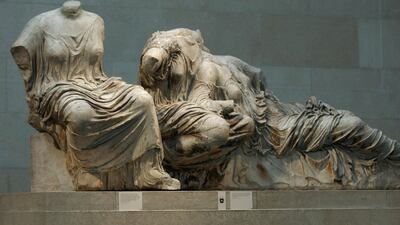The chairman of the British Museum trustees, George Osborne, has said he hopes to reach an agreement to send the Parthenon Marbles temporarily to Greece in a deal that would see some items that have never left the country appear in Britain.
Mr Osborne is optimistic that the British Museum can negotiate a deal over the Parthenon Marbles, long a subject of dispute between the UK and Greece.
Mr Osborne, 52, said: "We may well not succeed, but we think it’s worth trying."
“I hope we can reach an agreement with Greece,” he said during his speech at the annual trustees’ dinner in the Duveen Gallery – which currently houses the Parthenon Marbles, also known as the Elgin Marbles.
“An agreement that enables these great sculptures to be seen in Athens, as well as London; an agreement that allows other treasures from Greece, some that have never left those shores, to be seen here at the British Museum."
Greece has been campaigning for many years for the repatriation of the artefacts, originally part of the Parthenon on the Acropolis in Athens, arguing they were taken illegally during a time of foreign control.
British authorities, however, have consistently denied requests for their restitution.
Mr Osborne, addressing the Culture, Media and Sport Committee last month, highlighted the importance of the Marbles in the British Museum, noting their role in displaying the history of ancient Athens and its global influence.
“It’s not a particularly happy situation where we have had this stand-off with Greece for many decades, and the level of scholarship and engagement that we have with many other countries is not one that is replicated with some Greek museums,” he added.

“We want to create a proper partnership that would mean objects from Greece coming here, objects that have potentially never left Greece before and certainly never been seen before, and objects from the Parthenon collection potentially travelling to Greece."
How did the Parthenon Marbles end up in the British Museum?
The Parthenon Marbles were originally part of the Parthenon in Athens.
Lord Elgin, a Scottish nobleman, removed them from the ancient Acropolis in 1801 and subsequently sold them to the British government in 1816.
Their removal occurred during the Ottoman occupation of Greece, a period marked by the deterioration of the Parthenon.
Lord Elgin, who was British ambassador to the Ottoman Empire at the time, obtained special permission from the sultan, which he interpreted as authorisation to dismantle and export the Marbles.
Despite controversies regarding this interpretation, the Marbles were transported to England and eventually sold to the British Museum in 1816 for £35,000 ($43, 430) after Lord Elgin ran into financial difficulties.
These sculptures have been a centrepiece of the British Museum's Greek galleries ever since, despite continuing debates and calls for their restitution to Greece.
The British Museum maintains the legality of the acquisition, while critics view the situation as emblematic of British imperialism.
The issue remains unresolved, with the British government and the museum rejecting international calls and recommendations for their return to Greece.


